Ellebæk
Why incarceration?
Ellebæk is referred to as an "immigrant center", but is in fact a prison, primarily for rejected asylum seekers, but also for undocumented migrants. It is operated by the Danish Prison and Probation Service, and it is subject to the same regulations as closed prisons. The staff are prison guards.
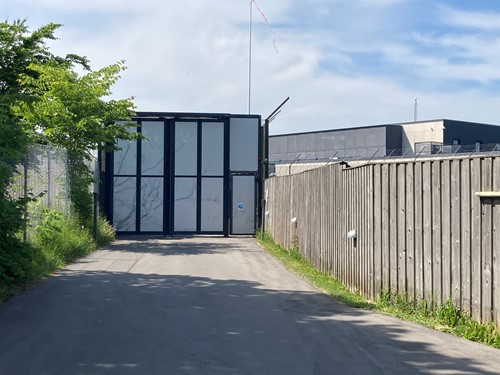
The inmates are not serving a sentence, nor are they in custody for crime. However, some may be detained after serving a sentence, with the aim of effecting a deportation order.
Most inmates are incarcerated or detained under Section 36 of the Aliens Act, which, for most of them, is based on suspicion that the person will go underground or that there is doubt about their identity. If the authorities are working to deport the person, either to another European country under the Dublin Regulation or to their home country, it is most practical for them to remain locatable. However, this can take many months and also prove hopeless.
If you arrive with a fake passport, which many are forced to do, you will risk incarceration in Ellebæk during the processing of your asylum case, after serving a sentence of 10 or 40 days in a real prison. This is a new and worrying trend in direct conflict with article 34 of the Refugee Convention which states that refugees should not be punished for using fake documents on their journey to safety. Read more.
Detention can also be used as a "motivational measure" for rejected asylum seekers, to pressure them into cooperating on their “voluntary” departure. It is the Return Agency or the police that request the detention. In some cases, the father of a family is detained to put pressure on the entire family to leave the country voluntarily, or to ensure that the family can be located if a forced deportation is being planned.
According to the law, you can be incarcerated for up to 18 months in a row and on several occasions. It requires a judge to extend the police's or the Return Agency's request for imprisonment every 4 weeks, but this is routinely done via video link in Hillerød Court, and the random, appointed lawyers often do not meet the inmates at all. The lawyer sits together with the police or the Return Agency and the judge; the inmate alone in front of a screen in Ellebæk. Only committed immigration lawyers succeed (and this rarely happens) in getting the judge to release the inmate against the wishes of the police or the Return Agency. The inmates are usually given insufficient information about their own rights, and do not always know the name of their own lawyer. For the ones who are detained after serving a sentence, the upper time limit of 18 months does not apply.
The information in the leaflet (link to Danish version) that the inmates are given on arrival does not match the reality described by former inmates, contact persons and the legal advisers at DRC Danish Refugee Council who regularly visit the site.
The hardest mental burden is that the inmates do not understand why they are imprisoned and have no idea when they will be released – or to where.
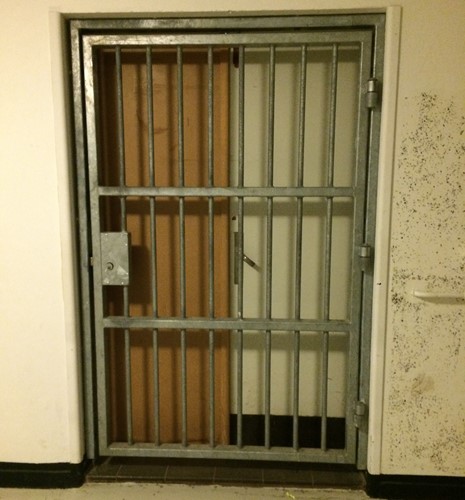
Physical conditions
The buildings were originally part of a large military barracks complex, which also included the neighbouring buildings that today make up the Reception Center Sandholm for asylum seekers. Ellebæk consists of long, low barracks, and the entire area is fenced off with a double, 4 meter high prison fence with NATO barbed wire and shells on the ground that make noise when you step on them, and extensive camera surveillance.
Ellebæk was established in 1989 and has been renovated and expanded several times, most recently in 2020, when a fact sheet (in Danish) was prepared for the Danish Parliament. Today there is room for 121 persons, but there has often been overcrowding, and a new wing has been built years ago but is still not in use. On average, only 9% of the inmates are women, who live in a separate building.
Most of the cells are small and old, with two people living together, and shared bath and toilets in the hallway. You can move freely within each of the 4 buildings, but access to the outdoors is very limited: only 15 or 30 minutes twice a day. The inmates participate on some days in the preparation of meals, which are served three times a day in a canteen. They can choose to work while in detention and earn an hourly wage of app. 11 DKK.
Due to lack of staff, especially among the women, inmates sometimes do not have access to the outdoors for extended periods, and other rights may also be violated due to staffing shortages. To date, only one film crew has ever been allowed to film inside Ellebæk, which was TV2 in 2019. The footage can still be viewed online.
Although the inmates are not serving a sentence and, according to a ruling from the National Court of Østre Landsret, have the right to have their mobile phones, they are subject to the prison rules, which impose a 15-day solitary confinement punishment for being caught with a mobile phone. Therefore, inmates are forced to use landline payphones, which are expensive and limit their privacy. Inmates also do not have access to the internet, severely restricting their communication with the outside world.
Visitors
Getting a visit from the outside requires the inmate to submit a visitor request, and the visitor must first obtain a permit. Afterward, appointments can be scheduled in advance within limited time slots. Visits take place in a special, locked room and typically last for an hour and a half.
To enter, visitors must first go through a gate at the parking lot and then pass through security checks like any other closed prison. Visitors are not allowed to bring phones, drinks, or sharp objects. Food must be eaten during the visit.
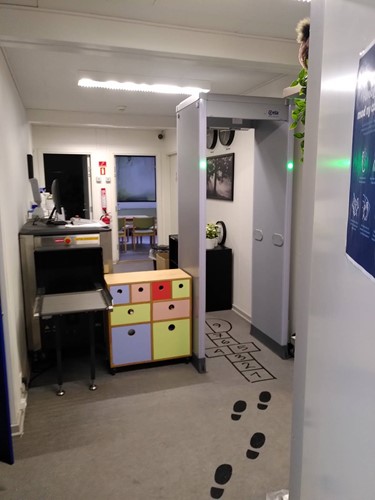
Vulnerable persons
According to international guidelines, asylum seekers must not be detained at all unless it is the last resort, and only for short periods. Even more problematic is the incarceration and confinement of victims of torture and trafficking, pregnant women, physically and mentally ill and elderly people. Still, there is only a superficial screening conducted by a police officer and a nurse upon admission to Ellebæk, and access to doctors and psychologists is very limited. Furthermore, the waiting time for torture assessments is unacceptably long, often only occurring when a lawyer contacts Amnesty's volunteer Medical Group, which has limited capacity.
The detention of these groups mentioned above can, in some cases, in and of itself constitute inhumane and degrading treatment. Many suicides and suicide attempts have been documented in Ellebæk, and many experience severe anxiety and depression reactions. This has been documented for a long time, both by Amnesty International's Danish Medical Group and Ellebæk Contact Network.
Children should not be placed in adult prisons, but according to the Prison Services' own records and Refugees Welcome's experiences, small children have been detained together with their mothers for short periods, as well as unaccompanied minors whose age was in dispute. The Ministry notes that "detention of families with minor children and unaccompanied minors is only carried out as a last resort and for the shortest possible time." In the official records of occupancy categorized by gender and age, the column for under 18 years states "not disclosed."
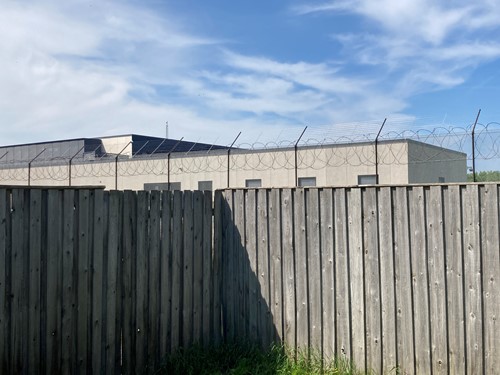
Criticism
Refugees Welcome has criticized the place since 2009 when we had an article in Danish newspaper Weekendavisen, and we have drawn attention to the unfair situation many times since. We had exclusive access to the facility in 2016 and subsequently wrote a fact article on our own website. Most recently, we were co-signatories to a letter to the Danish Parliament's Legal Affairs Committee in June 2023 with massive documentation for unacceptable conditions collected by the voluntary group Ellebæk Contact Network (read more in this News article).
Amnesty International has also criticized the conditions at Ellebæk multiple times and has an extensive webpage with questions and answers about the place (in Danish). The organization published a series of articles with interviews of former detainees in its member magazine back in 2011, and in 2013, Amnesty's Danish Medical Group released a report on the subject (in Danish).
Denmark received scathing criticism from the Council of Europe's Committee for the Prevention of Torture after their visit to Ellebæk in 2019 and demanded the place closed, which, however, resulted in only partial renovations.
From a rule of law and human rights perspective, it is entirely wrong to use society's harshest punishment, namely deprivation of liberty, as a preventive measure against something that does not harm others – namely, going underground or refusing to leave. It is also against democratic principles to lock people up to change their attitude – in other words, to break their resistance and pressure them to comply. Such practices are usually only seen in dictatorships.
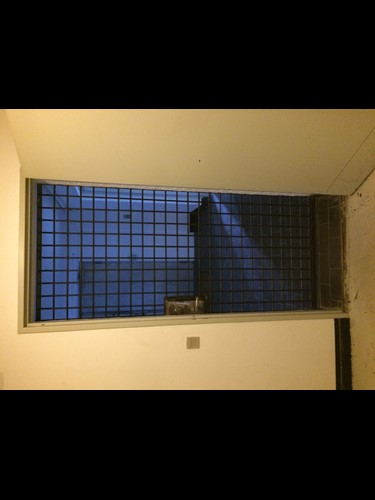
Photos: Michala Clante Bendixen and Ellebæk Contact Network.
As a member, you support
our fight to close down Ellebæk

